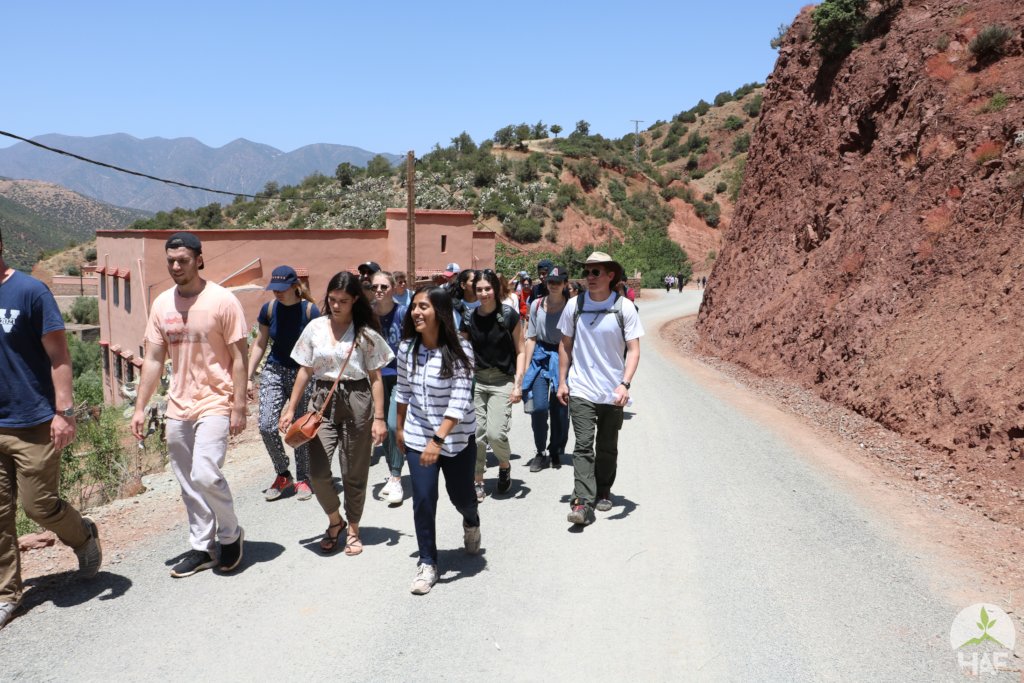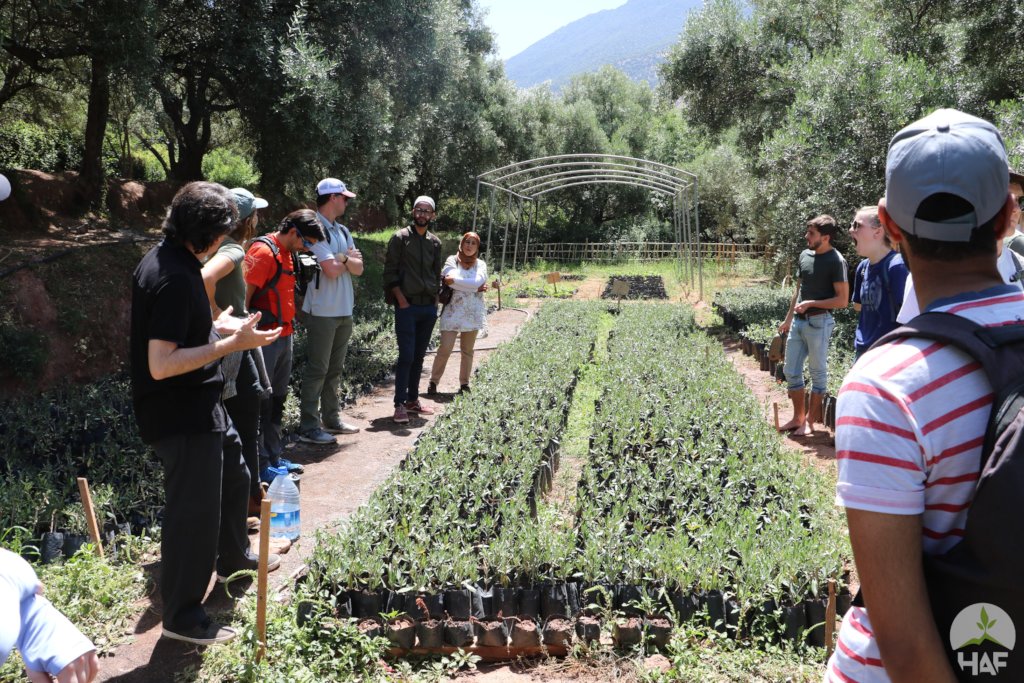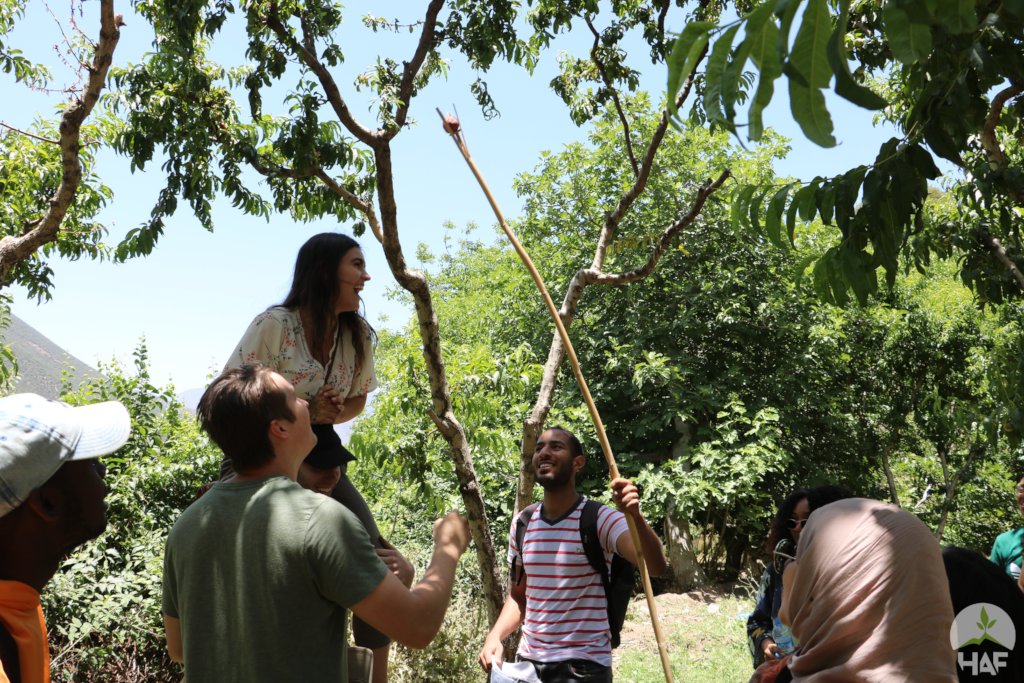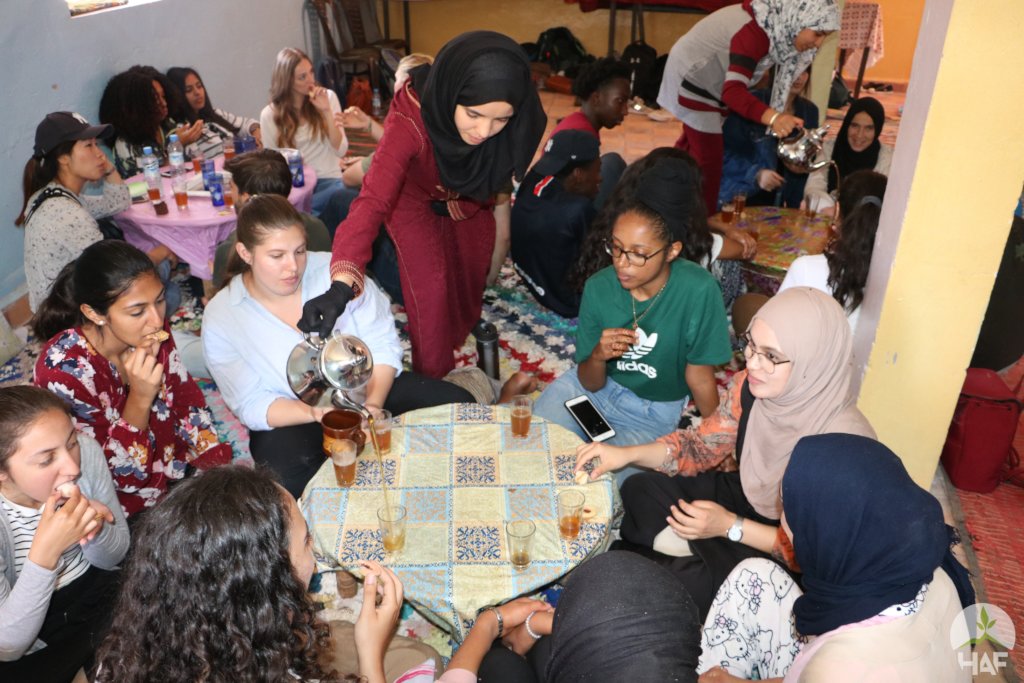By Hugo Dubois | HAF Volunteer
Marrakech, 9am. My first field trip.
We boarded the vans that would lead us to our hosts for the day. We had two hours of travel through the Atlas Mountains ahead of us to reach Tassa Ouirgane; a village perched somewhere in the mountains. We left the city, its constant noise and movement, to discover the quietness of the fields, villages and people that populate the surrounding area. Soon, we are at the foot of the Atlas Mountains, ready to begin our winding ascension.
The road follows a narrow, precious stream that winds through a gorge. On the right, appeared the first village; donkeys, men, land, the rurality is apparent... Going up the river, the landscape opens up a bit, and gives way to a valley, narrow and green, descending from the mountains between the bright red mountain sides. Emerging from this oasis, a few slender white creatures fly over the valley. The contrast is striking and of a singular beauty; here, water is scarce, and one can feel it.
We will stop in a lively village upstream. The cool mountain air is cut with the smoke from the fresh lamb and chicken being cooked. The stillness of life is replaced with the lively bustle of the souk. Men are agitated in front of the stalls, they want to sell us a bracelet, a stone, a meal; offers abound for visitors like us, all with the promise of “For you, I give good price.”
Wandering away from the souk, I found company in the big trees along the road. On my right, I had a nice view into the lush green valley. I advanced slightly, finding myself immersed in the scent of almond trees and the sounds of white birds. I felt for a moment the intensity of this prosperity- the rareness of it- considering its value in these desert mountains.
We continued our journey through several more villages, valleys and landscapes, all equally as breathtaking... The road soon led us to a dirt track, on which we drove following its gentle curves and marveling at nature’s decor. The higher we went, the more rivers became streams; everything was affected…
Finally, we reach a quaint, sleepy village, near an empty old building in mud bricks. It is here, or rather slightly below, that we will stop. Down a narrow path, we walk through olive plantations in terraces on the hillside. Theshade is nice, and one can almost feel the resilience they have shown to thrive here.
A little ahead, we stop for a time to visit the nursery where a great number of olive saplings (their little brothers) are kept in black plastic bags, all ready for planting. We could feel the release of energy of an organized life, the will to raise and create prosperity was palpable.
This was an opportunity for us to meet one of the villagers. Through the translation of his Arabic, he told us about his situation, concerns, and vision. This man seemed torn about his rural roots in his way of expressing himself, his modern features, expressed in his appearance, perfectly trimmed beard and modern clothes, came in sharp juxtaposition to the rural village and setting to which he called home. In the discussion, he stressed the importance of the plantations for him and his community. It was not a question of purely agricultural notions, it was a question of prosperity, future, and quality of life for himself and his family.
We walked down to the heart of the village, stopping at an orchard overlooking the valley. The charm was there, and the trees gave away their fruits with little effort.
We then met a group of women, all dressed traditionally. A deep gap seems to separate them from our western group. Through their words, we could easily discover that their lifestyle, their concerns, their expectations were rather different from ours. However, something still seemed to connect us. Despite their relative isolation, they are rather content and feel comfortable in the place that is theirs. A singular humanity emerged from them.
Later in the afternoon, they invited us to join them in a large room, where we shared a traditional meal of couscous. We sat together on the floor in more or less mixed groups, the room was filled with a good atmosphere rich in discussions and sharing. The food was delicious steeped in the flavor of tradition.
I alternated discussions with colleagues in the room and going outside to escape the noise. Curiously enough, it is outside that I engaged in the most contact with the local people, exchanging with them through brief discussions. A simple and authentic connection was established. For a moment, I stopped and sat down to admire the place and the mountains. There is something slow, static and great; feeling that time is passing beyond us, flowing slowly, surely and peacefully; one should only let go and be carried away by this flow and merge with it.
At a street corner, I met some children, laughed with them, and then passed a mosque where women go for their prayers. Here, there is not much, and the weight of tradition is present.
I finally joined the group, where a final dialogue and a farewell took place. It was a pleasure to share a moment and a slight emotion of benevolence. We left our hosts leaving them to their peace and boarding our vans to go back to town. It was a visit rich in feelings and impressions.
Thanks to the United Nations Development Program, which funded the nursery, the village irrigation system and gabion baskets to prevent erosion of the river; not to mention the empowerment workshops in Tassa Ouirgane.
Project reports on GlobalGiving are posted directly to globalgiving.org by Project Leaders as they are completed, generally every 3-4 months. To protect the integrity of these documents, GlobalGiving does not alter them; therefore you may find some language or formatting issues.
If you donate to this project or have donated to this project, you can receive an email when this project posts a report. You can also subscribe for reports without donating.
Support this important cause by creating a personalized fundraising page.
Start a Fundraiser


